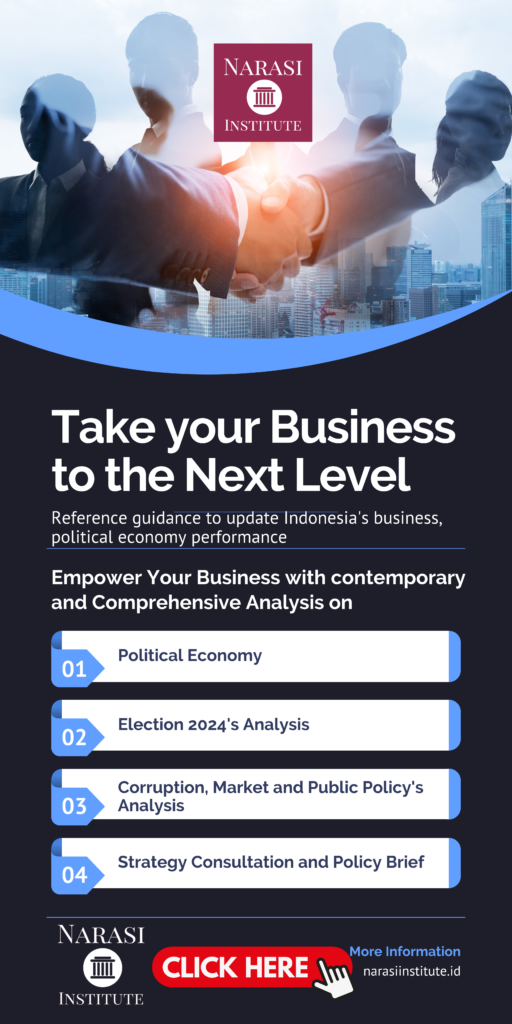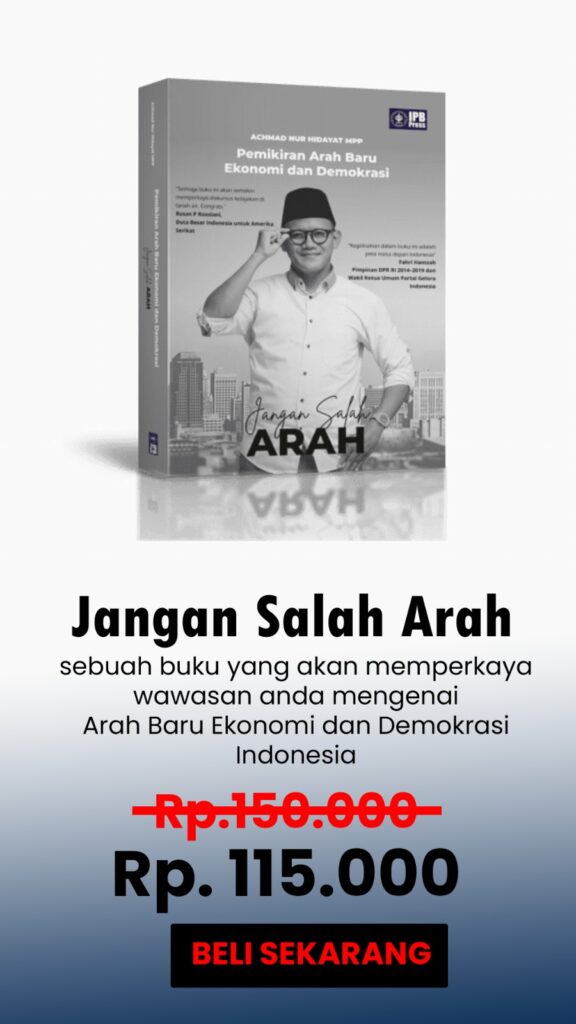Achmad Nur Hidayat, MPP, Economist, and AMIN Vision and Mission Team
THE “Golden Indonesia 2045” aspiration heralded by presidential and vice-presidential candidates Anies Baswedan and Muhaimin Iskandar (AMIN) marks a progressive and visionary step in steering Indonesia towards a brighter and more advanced future. With the leadership of Anies and Muhaimin, this initiative is not merely a slogan, but a blueprint for comprehensive national transformation.
Firstly, under the leadership of Anies and Muhaimin, the focus on economic development will be a top priority. Both possess the experience and expertise to capitalize on Indonesia’s economic potential, including its vast natural resources and workforce. They can stimulate investment in infrastructure, education, and technology to accelerate economic growth.
Secondly, this pair emphasizes the importance of political stability and security as the foundation for economic growth and investment. They are committed to creating a stable and conducive political environment, which is crucial for attracting foreign investment and stimulating domestic economic growth.
Thirdly, Anies and Muhaimin understand the importance of equitable development and reducing social inequality. They are dedicated to ensuring that all segments of society benefit from economic growth, including better access to health services, education, and economic opportunities.
Fourthly, they also stress the importance of sustainable development and environmental preservation. As an archipelagic country with rich biodiversity, Indonesia under their stewardship will ensure economic growth does not harm the environment.
Fifthly, Anies and Muhaimin recognize the importance of strengthening national identity and unity amidst Indonesia’s cultural and ethnic diversity. They are committed to nurturing a sense of unity and nationhood, which is key to social and political stability.
Journey towards one nation and one state
Indonesia’s historic journey towards forming a national identity and a unitary state becomes an inspiration within the context of the vision and outlook of presidential and vice-presidential candidates Anies Baswedan and Muhaimin Iskandar, providing a strong foundation for understanding the importance of maintaining and strengthening the concept of “One Nation and One State.”
The AMIN pair deeply understands the historical values and struggles that have shaped Indonesia. They acknowledge that the fight to maintain Indonesia’s sovereignty and integrity is an ongoing process that requires unwavering commitment and dedication.
In their view, appreciating the struggles of predecessors as described in this article is key to building Indonesia’s future. They believe that respecting history and learning from it provides valuable lessons for building a stronger and more united country, which includes acknowledging the significant role of figures like Mohammad Natsir in maintaining the unitary state concept.
Furthermore, AMIN emphasizes the importance of education in reinforcing national identity. They aim to ensure that Indonesia’s youth understand and appreciate their nation’s history so that they can contribute to maintaining and strengthening the concept of “One Nation and One State.”
In the current political and social context, AMIN also understands the challenges Indonesia faces, including issues related to diversity and social integration. They are committed to working towards strengthening national unity, respecting diversity, and ensuring that every citizen feels an integral part of the Indonesian nation.
Mastering the seas and one homeland
The AMIN pair pays special attention to the importance of Indonesia’s maritime sovereignty. They value the Djuanda Declaration and the United Nations Convention on the Law of the Sea II 1982 as historical milestones affirming Indonesia’s sovereignty over its seas and territorial waters.
They are determined to strengthen national capacity in sustainably managing marine resources. This includes ensuring the protection of Indonesian territorial waters and promoting regional and international cooperation in marine resource management.
Both candidates also emphasize the importance of empowering coastal communities and fishermen, focusing on improving their access to markets and technology.
Additionally, AMIN plans to develop coastal infrastructure and boost investment in the maritime sector. They aim to ensure that fishermen and coastal communities directly benefit from marine resources.
This includes education and training to enhance fishermen’s skills, as well as developing related industries that can provide employment and economic growth. Both candidates are committed to making the maritime sector a key pillar in Indonesia’s economic development.
Challenges towards one prosperity
AMIN has a pragmatic and solution-oriented view of Indonesia’s prosperity challenges.
They acknowledge that despite significant progress, there’s still a long way to go in overcoming issues such as limited access to health services and education, poverty, unemployment, and economic inequality.
They particularly highlight the disparities between Java and other regions, as well as between urban and rural areas, as areas needing special attention.
To address these issues, Anies and Muhaimin emphasize the importance of developing infrastructure and services in rural areas and outside Java, with the aim of creating more economic opportunities and improving quality of life.
They are also committed to strengthening the agricultural and marine sectors, the backbone of many communities’ economies, through investments in technology, training, and market access. Their approach is to create equal opportunities across Indonesia, focusing on empowering local communities and using natural resources sustainably to drive inclusive economic growth.
Importance of human quality
Indonesia, with its large population and demographic bonus, has tremendous potential. However, education and competency challenges remain barriers. The majority of the population only has basic education, and the quality of education needs improvement.
AMIN places great emphasis on improving human quality as the key to national development. They understand that with Indonesia’s large population and demographic bonus, the potential for advancement is significant but hindered by challenges in the education and competency sectors.
To address this, AMIN views education as an investment for the nation. They believe that enhancing the quality of teachers and education is an important first step. This involves not only increasing teachers’ salaries and training but also developing a curriculum more relevant to the needs of the times and improving educational infrastructure.
They also stress the importance of increasing the budget for research and development. They view innovation and research as keys to advancing Indonesia in various fields, including technology, economy, and social aspects.
It’s well understood if AMIN has a strong commitment to creating an environment conducive to intellectual growth and innovation, which will ultimately lead Indonesia to greater and more sustainable progress.
Tackling poverty, unemployment, and inequality
Poverty and unemployment are serious issues that exacerbate social and economic inequality. Data shows that most Indonesians cannot afford nutritious food, and unemployment is high among primary and secondary education graduates.
Income and wealth inequality in Indonesia is also higher compared to many other countries. The sandwich generation phenomenon, where productive workers are burdened with financial family responsibilities, further exacerbates inequality.
The challenge to be faced is poverty and unemployment. These issues must be tackled with pragmatic and inclusive strategies. AMIN feels it’s necessary to improve the effectiveness of social assistance programs, including direct cash transfers and food subsidies, and develop infrastructure in remote areas to expand access to basic services and economic opportunities.
This approach aims to directly reduce poverty and improve the quality of life of the communities.
They also emphasize the importance of job training and vocational education to improve the workforce’s skills, especially for primary and secondary education graduates. This step is expected to not only reduce unemployment but also create a fairer society and more equitable economic opportunities.
Global climate crisis and its impact
AMIN recognizes the seriousness of the global climate crisis and its impact on Indonesia, particularly in coastal regions and the agriculture and fisheries sectors. They stress the importance of a comprehensive mitigation strategy, including developing environmentally friendly infrastructure and enhancing early warning systems for natural disasters. This approach aims to reduce the vulnerability of coastal areas to climate change, such as land subsidence and rising sea levels.
They see the need to focus on adaptation, by promoting sustainable agricultural and fishing practices that are resilient to climate change.
For this, investment in adaptive agricultural technology research and development, as well as education and training for farmers and fishermen to increase their resilience to the impacts of climate change, is necessary. These steps are expected to reduce the negative impacts of climate change and ensure the sustainability of Indonesia’s natural resources.
Towards change for one Indonesia one prosperity
AMIN is eager to realize the concept of “One Indonesia One Prosperity” by emphasizing the importance of paradigm shifts, governance, and policy changes.
They recognize that to achieve equitable prosperity, a shift in focus is needed from government officials to the people, marking a transition to a more inclusive government oriented towards community needs.
This approach also involves changing from a sectoral development strategy to a regional-based one, ensuring that each region benefits evenly from national development.
To achieve “One Indonesia One Prosperity,” a change in paradigm, governance, and policy is required. Four aspects of change that must be focused on are: (1) from government officials to the people, (2) from sectoral to regional, (3) from growth alone to sustainable growth, and (4) from an egocentric approach to collaboration and mutual support. These changes must be supported by all national elements, with competent, integrated, and collaborative national leadership.
Indonesia, with a strong foundation laid by the nation’s founders and past leaders, must continue to strive to achieve social justice and prosperity. It is a historical responsibility to complete the One Nation, One State, One Republic of Indonesia, and One Homeland realized by previous generations.
Source: kbanews.com








